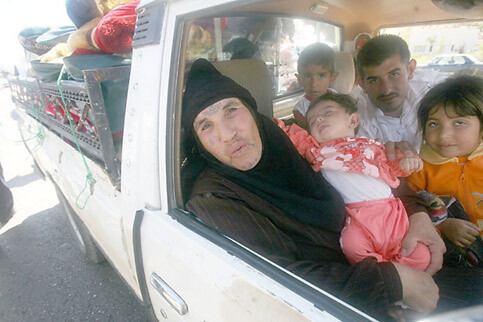United Nations Human Rights Council 4 October 2006

A Lebanese Bedouin woman and her family prepare to cross the Syrian-Lebanese border just hours after the ceasefire came into force, 14 August 2006. (UNHCR/A.Branthwaite)
Philip Alston, Special Rapporteur on extrajudicial, summary or arbitrary executions; Paul Hunt, Special Rapporteur on the right of everyone to the enjoyment of the highest attainable standard of physical and mental health; Walter Kaelin, Representative of the Secretary-General on the human rights of internally displaced persons; and Miloon Kothari, Special Rapporteur on adequate housing as a component of the right to an adequate standard of living issued the following statement today following their presentation of a joint report on a mission to Lebanon and Israel:
A detailed study presented by four UN experts to the UN Human Rights Council in Geneva on Wednesday concludes that serious violations of human rights and humanitarian law were committed by Israel during the recent conflict in Lebanon. In many instances, Israel failed to distinguish between military and civilian objectives; to fully apply the principle of proportionality; and to take all feasible precautions to minimize civilian injury and damage.
The experts also concluded that Hezbollah violated humanitarian law in many instances by targeting civilian populations and by disregarding the principle of distinction.
These are the main conclusions of a fact-finding mission carried out from 7-14 September by Philip Alston, expert on extrajudicial executions, Paul Hunt, expert on the right to health, Walter Kaelin, expert on internally displaced persons; and Miloon Kothari, expert on the right to housing.
Among the key recommendations of the report:
The four experts are: Philip Alston, Special Rapporteur on extrajudicial, summary or arbitrary executions; Paul Hunt, Special Rapporteur on the right of everyone to the enjoyment of the highest attainable standard of physical and mental health; Walter Kaelin, Representative of the Secretary-General on the human rights of internally displaced persons; and Miloon Kothari, Special Rapporteur on adequate housing as a component of the right to an adequate standard of living.
Summary of Factual Information in Experts’ Report
In Lebanon, Israel’s Air Force attacked more than 7,000 targets in Lebanon, its Navy conducted 2,500 bombardments, and its Army fired tens of thousands of shells and rockets. Lebanon was bombed in the south, in Beirut and elsewhere including the Bekaa Valley. As a result, 1,191 people were killed and 4,405 wounded. One third of the dead and wounded, and close to half of the IDPs (internally displaced persons), were children. (It is unclear how many of those killed were Hezbollah fighters.)
Tens of thousands of homes and much public infrastructure were damaged or destroyed. An estimated 1 million persons were displaced. In the suburbs (Dahiye) of Beirut alone, bombs destroyed 150 apartment buildings and damaged another 150, leaving between 30,000 and 60,000 persons homeless. In the south entire villages were virtually destroyed. Even today, 200,000 people have been unable to return to their homes.
In Israel, Hezbollah fired up to 4,500 rockets affecting large areas of the northern third of Israel. 900 of those rockets hit built-up areas. As a result 43 civilians, one third of whom were Arab Israelis, were killed. Seven children were among them. 75 civilians were seriously injured, and hundreds of others wounded.
Official figures indicate 12,000 buildings were damaged and 300,000 individuals fled south. Of those who remained, hundreds of thousands sought refuge, for at least some time, in bomb shelters.
Beyond these figures, the report notes that, in Lebanon, 12 medical facilities were destroyed and 38 severely damaged. Ambulances and medical convoys were attacked, and Lebanese Red Cross workers killed and injured. In the south, those who remained, including the elderly and disabled, were cut off for some weeks from elementary health care, water and sanitation. Even today, unsafe and high-density housing conditions, inadequate access to water, sanitation and electricity and unremoved rubble from the destruction remain pressing problems. In a country where health care coverage was already unsatisfactory, pre-existing inequalities have been deepened.
In Israel, four hospitals were damaged and the patients from one psychiatric hospital were evacuated to central Israel. Many spent entire days in overcrowded, unhygienic shelters, and had very limited access to medical services. Arab citizens of Israel are reported to have received significantly less access to health services than their Jewish counterparts, and arrangements to compensate them for housing and other damage resulting from bombing is alleged to have discriminatory dimensions.
In both countries, the conflict has had a profound impact on mental and psychosocial health. Some will suffer from disabling post-traumatic stress disorder for the rest of their lives. In both countries, the health of the poorest and most vulnerable, especially women, children and the elderly, suffered most.
In Lebanon, the consequences of an estimated one million cluster bomblets dropped by Israel remain disastrous. An intolerably high rate of unexploded bomblets, combined with the failure of Israel to provide the information required to facilitate their systematic elimination, has led to 14 deaths since the end of the conflict and made the return of large numbers of civilians unsafe.
Related Links